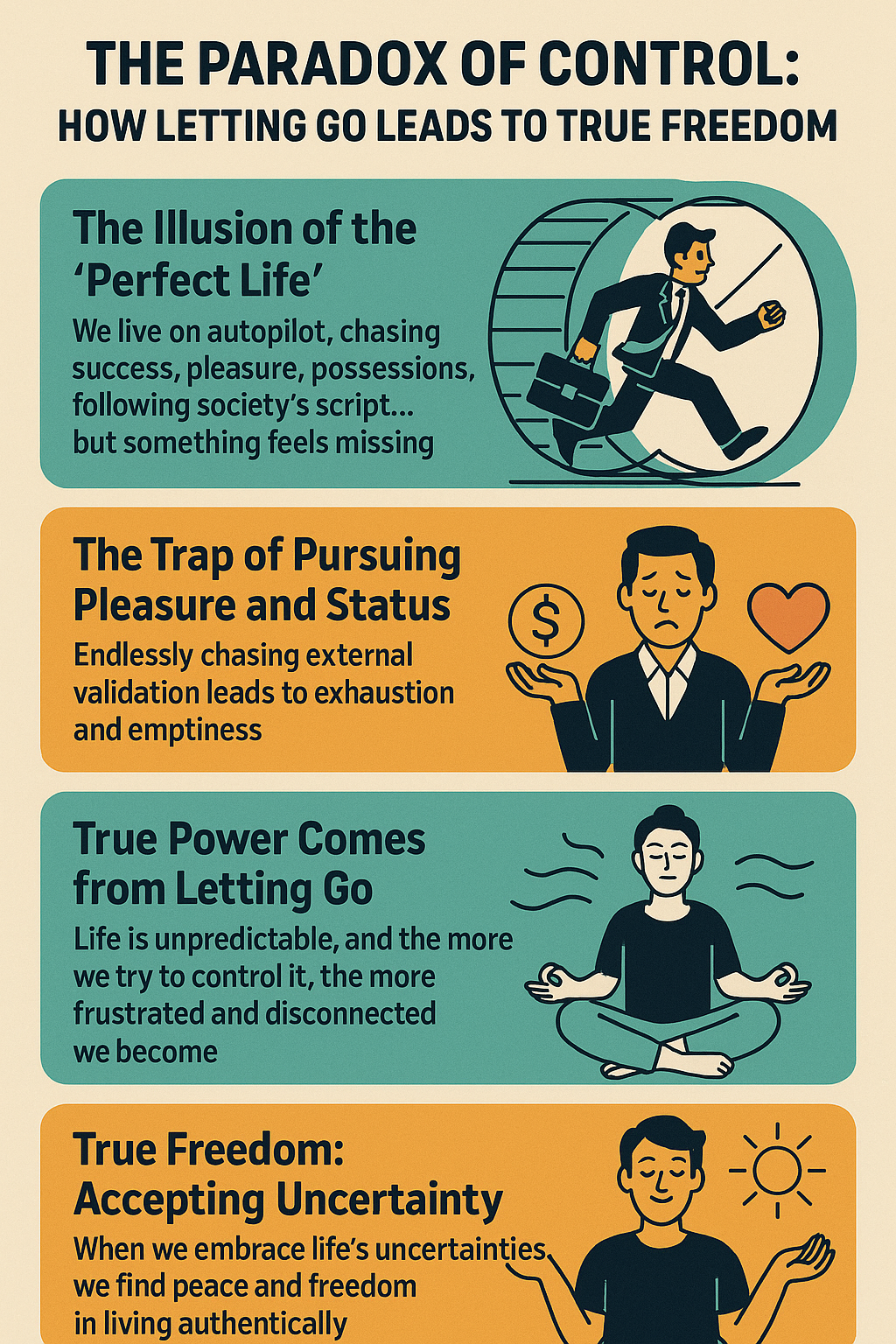In a world obsessed with accumulation, success, and control, many people live their lives on autopilot, chasing fleeting pleasures, accumulating things, and following a script written by others. Yet, even when all seems in place, there’s often an underlying feeling that something is missing. Could it be that we’re so caught up in the race for external validation that we’ve lost touch with our true selves? In this article, we explore why this path is leading us nowhere and how embracing uncertainty and letting go of control might be the key to finding true freedom and fulfillment.
The Illusion of the “Perfect Life”
From an early age, society programs us with a set of goals: get a good education, secure a stable job, buy a house, and live comfortably. But what if these aren’t the true desires of our hearts? The reality is, many people live according to a script they were handed by their parents, culture, and society, never stopping to ask themselves, “What do I truly want?”
For most, answering this question is difficult because we are trained to think of happiness as something external: promotions, possessions, social approval, and financial security. But this race for external validation only leads to burnout and emptiness, as the goalposts continually shift, and we are left chasing something that never seems to arrive.
The Trap of Pursuing Pleasure and Status
The endless pursuit of pleasure—whether it’s buying more things, climbing the career ladder, or seeking out the next social high—may feel satisfying in the moment, but it’s ultimately a path to emptiness. Alan Watts, the philosopher who examined human nature with brutal honesty, revealed that the more we chase pleasure, the more we distance ourselves from true fulfillment. This endless striving for more is like a race with no finish line, a race where we trade our lives for something that never truly satisfies.
When we chase financial security and social status, we are often trading our passions, our energy, and our time for something that won’t bring long-term happiness. The trap is that we are conditioned to believe that happiness is somewhere in the future, always just out of reach. The moment we reach a goal, we set a new one, only to find ourselves right back where we started—exhausted and unfulfilled.
The Secret to True Fulfillment: Follow Your Passion
The key to unlocking true fulfillment lies in discovering what truly ignites our passion. It doesn’t matter if it’s painting, teaching, gardening, or cooking. When you pursue what you love, something magical happens—you become naturally good at it. The universe, it seems, conspires to help those who follow their authentic path.
Alan Watts proposed a thought experiment to help people reconnect with their inner desires: Imagine a world where money didn’t exist. What would you do with your time? How would you spend your days? For many, this question unveils passions that were buried long ago—passions they had forgotten or suppressed due to societal pressures.
By following these authentic desires, individuals often discover that they become so skilled that their work naturally turns into something that others are willing to pay for. This is the magic of doing what you love: not only does it bring joy and meaning, but it also often leads to unexpected success.
The Problem with the Educational System and Social Conditioning
Our current educational system does little to awaken our passions; in fact, it often stifles them. Students are taught to follow a set path, to memorize information, to pass tests, and to acquire diplomas—not because these things bring fulfillment, but because they open doors to jobs that may not align with their true selves.
The system is built around the idea of delaying happiness until a distant future when one can finally retire or achieve a specific status. But the problem is that, by the time many people reach retirement, they no longer have the energy or health to pursue the dreams they put on hold for so long. This is a tragic waste of time, a system that teaches us to sacrifice the present for a future that may never materialize.
The Deeper Question: What Do You Really Want?
Beyond professional goals, there is a deeper question to ask: What do you really want out of life as a human being? When was the last time you sat down and honestly asked yourself this question, without the pressure of society’s expectations? Most people never stop to think about this deeply. They react to life’s circumstances, making decisions based on fear or social pressure, without listening to their true desires.
When people finally take the time to reflect, they often realize that their desires are simpler than they thought. They want to feel useful, have genuine relationships, wake up energized, and grow as individuals. However, society teaches us to crave power and pleasure above all else, and we are constantly bombarded with messages that tell us we need more—more possessions, more status, more control—to be happy.
The Illusion of Control
In the modern world, control is an obsession. We want to control every aspect of our lives—our careers, our relationships, our health. We seek technologies that promise to make everything predictable and perfect. But the more we try to control our lives, the more we realize how little control we actually have. Life is unpredictable, and no matter how much we try to plan, things can and will change.
This need for control comes from fear—fear of the unknown, fear of suffering, and fear of losing control. But this constant striving to control everything only leads to frustration and suffering. Life is meant to be lived with spontaneity and joy, not in a constant state of anxiety about the future.
The Paradox of Spontaneity and Growth
Life’s beauty lies in the unexpected. The most memorable moments in life are often unplanned—unexpected encounters, unanticipated opportunities, and unforeseen challenges that make us grow. If we eliminate all surprise from life, we lose the very essence that makes life worth living.
Watts observed that life would be dull and boring if everything were predictable. It is the unpredictability of life that gives it color and meaning. The special moments, the ones we cherish, come from the spontaneous interactions, the unplanned encounters, and the risks we take.
The True Power of Letting Go
True power does not come from control, but from adaptability. Life is like water—it doesn’t fight against obstacles, but flows around them. Trying to control everything only drains our energy, while embracing life’s natural flow allows us to conserve energy and find true peace. This understanding is liberating: the more we let go of the need to control, the more power we gain.
When we stop fighting against life and start working with it, we discover an immense source of creative energy and joy. We stop trying to force things to happen and instead let life unfold naturally. This allows us to truly live and experience life’s richness without the burden of constant striving.
True Freedom: Accepting Uncertainty
At the core of the modern human condition lies a paradox: the more we try to control everything, the more disconnected we become from our true essence. Watts shows us that the path to true freedom is not in controlling every aspect of life, but in embracing uncertainty and living authentically. When we accept that we don’t need to control everything, we open ourselves to the natural flow of life and experience true peace.
True freedom comes from accepting our humanity, with all its limitations and uncertainties. When we let go of the need to define ourselves by external standards, we reconnect with something much greater than ourselves—an intelligent force that guides us naturally and effortlessly through life.
Conclusion: The Freedom of Being Yourself
Ultimately, true fulfillment comes from accepting who we are and what we already have. The pursuit of pleasure, power, and material success only leads to emptiness. But when we stop chasing, we discover that we are already complete, and that happiness exists in the present moment. This shift in perspective leads to true freedom: the freedom to be yourself, to live authentically, and to embrace life as it is—without masks, without performances, and without the pressure to conform.
Alan Watts teaches us that the greatest wisdom comes from realizing that we don’t need to chase anything to feel complete. We already have everything we need for a meaningful life. This realization is the key to living a life of true freedom, joy, and peace.
Here’s a point-by-point breakdown of each concept from the transcript:
1. The Life You’re Living: A Copy of Expectations? (0:00-0:25)
- The question is raised: What if the life you’re living is merely a reflection of what society or others told you should be your goal? The speaker encourages questioning if you’re living your own life or just following a prescribed script.
- The feeling of emptiness despite seemingly having everything is identified as a common experience.
2. Chasing Quick Pleasures and Accumulating Things (0:25-0:45)
- The metaphor of “rats on a wheel” is used to describe modern life, where people chase fleeting pleasures and accumulate material possessions without finding true fulfillment.
- Alan Watts is introduced, emphasizing that the pursuit of pleasure is a path to emptiness.
3. Questioning Your True Desires (0:51-1:18)
- A question is posed: What do you truly want, independent of societal pressures or family expectations?
- Most people, conditioned by societal roles, struggle to answer this, having lived on autopilot, not reflecting on what makes them truly passionate.
4. Social Conditioning and the Script We Follow (1:18-1:33)
- Society imposes a set of goals: study, work, buy a house, get married, have children, and so on. But the key question remains: Do we genuinely want these things, or are they just expectations placed upon us?
5. Alan Watts’ Critique of Status and Money (1:33-1:59)
- Watts critiques society’s addiction to status and money, pointing out that many people make choices based on financial gain rather than pursuing genuine joy.
- People get trapped in cycles that leave them exhausted and disconnected from what truly matters.
6. Trading Life for Financial Security: The Trap (2:04-2:28)
- Watts highlights the pitfall of pursuing financial security at the expense of genuine fulfillment.
- The idea that the future always holds a new financial goal or material objective is discussed. There is always a new “finish line” that never really arrives, leading to a race without true direction.
7. True Fulfillment Comes from Passion, Not Money (2:35-2:48)
- The concept that true fulfillment arises from following one’s passion is emphasized. Engaging in what you love brings joy, and often success, without it being driven by financial motives.
- When you do what you love, the results tend to be naturally rewarding, as if the universe supports this path.
8. The Exercise: What Would You Do If Money Didn’t Exist? (2:53-3:12)
- Watts suggests a mental exercise: imagine a world where money doesn’t exist. What would you do with your time? This question helps reveal what truly drives you, free from financial concerns.
- Many people, initially lost, discover forgotten passions through this exercise.
9. Reconnecting with Lost Passions (3:12-3:43)
- People recall dreams and interests they have suppressed over time, such as music, teaching, or working with nature.
- These passions, although they may seem “unproductive” initially, point to one’s true essence and bring fulfillment when pursued.
10. The Magic of Following Your True Interests (3:43-4:25)
- When people follow their true interests, they often become highly skilled in those areas, and this skill can eventually become financially rewarding.
- The universe seems to conspire to help those on their authentic path.
11. The Educational System and Suppression of Passions (4:44-5:05)
- Watts critiques the educational system for killing passions by teaching children to conform, suppress their true desires, and focus on external rewards like degrees and jobs.
- This system teaches the idea of sacrificing present well-being for an uncertain future, which often leads to dissatisfaction.
12. The Dilemma of Work and Unfulfilled Lives (5:11-5:43)
- Many people spend decades in careers they dislike, only to retire with regret because they are no longer physically able to pursue what they loved.
- This “sacrifice” is critiqued as a system that drains life energy for something that doesn’t ultimately provide fulfillment.
13. The Cost of Following Society’s Expectations (5:43-6:17)
- The metaphor of a hamster on a wheel illustrates how people waste their time chasing societal goals (like money and status) without ever feeling fulfilled.
- Despite having the option to step off the wheel, many people stay on it due to the pressure of societal expectations.
14. The Illusion of Power and Pleasure (6:28-7:11)
- The pursuit of power and pleasure is often seen as the ultimate goal, but this creates an endless cycle of dissatisfaction.
- True happiness does not lie in these pursuits but in simpler desires like having genuine relationships, feeling useful, and growing as a person.
15. Jung’s Wisdom on Life’s Purpose (8:08-8:15)
- Carl Jung’s philosophy is introduced, stating that a purposeful life is born from listening to the unconscious and not following superficial societal goals.
- The speaker notes that society promotes the pursuit of power and control, but these pursuits often lead to emptiness.
16. The Modern Obsession with Control (8:15-9:07)
- Society’s obsession with control—over careers, relationships, health, and the future—is revealed as a fear-driven attempt to avoid uncertainty and suffering.
- This desire for control paradoxically creates more suffering and less freedom.
17. The Limits of Control and the Paradox of Life (9:07-9:56)
- Watts observes that as people try to control every aspect of their life, they realize how little control they truly have.
- Trying to control life’s uncertainties leads to frustration and anxiety, robbing individuals of spontaneity and joy.
18. The Magic of Uncertainty and Spontaneity (10:01-10:44)
- Uncertainty is presented as the source of life’s beauty, growth, and joy. Life’s unpredictability is what gives it color and meaning.
- The best moments in life—relationships, opportunities, and growth—often arise unexpectedly.
19. The Wisdom of Taoism and Zen (11:27-12:02)
- Taoism and Zen philosophies are referenced for their understanding of living harmoniously with life’s uncertainties, comparing wise living to water flowing around obstacles.
- Flexibility and adaptability are key to finding inner peace and true power, as opposed to rigid control.
20. The Illusion of Power and Its Burden (12:02-13:05)
- The pursuit of absolute power brings with it tremendous responsibility and isolation.
- Powerful people often find their relationships and interactions lack sincerity, as others may only relate to them out of self-interest.
21. The Tragic Fate of Excess and Hedonism (13:05-14:07)
- The pursuit of excessive pleasures leads to a loss of fulfillment and an eventual need for more extreme experiences.
- Watts highlights the pattern of excess leading to emotional emptiness, similar to the decline of the ancient Romans.
22. The Cycle of Seeking and Suffering (14:07-15:11)
- The cycle of seeking more pleasure to escape emptiness results in a vicious loop, where temporary pleasure leaves a bigger void.
- This pattern of seeking becomes an endless chase with no lasting satisfaction.
23. The Importance of Acceptance and Humility (15:17-16:02)
- The Zen master Bodhi Dharma’s approach to accepting uncertainty and mystery in life is highlighted.
- True wisdom comes not from defining everything but from embracing life’s unknowns.
24. Releasing the Obsession with Control and Living with Ease (16:02-17:19)
- By letting go of the obsessive need to control every aspect of life, we access greater energy and flow with life’s natural rhythm.
- This acceptance allows for true power and alignment with the universe’s natural wisdom.
25. The Paradox of Seeking Power and True Freedom (17:19-19:04)
- The more people seek control, the more disconnected they become from their true essence.
- Watts suggests that true freedom arises when we relinquish our need for control and accept our humanity.
26. The Wisdom of Nature: Flexibility and Strength (19:04-20:10)
- True strength comes from being flexible and adaptable, like water, which flows around obstacles rather than breaking against them.
- The metaphor of a tree that bends but doesn’t break illustrates the power of going with the flow of life.
27. The Illusion of Perfect Control and the Path to True Freedom (20:10-21:04)
- The pursuit of perfection and control leads to frustration and a lack of joy.
- The true path to freedom is accepting life as it is and living with ease and presence in the moment.
28. The Real Power: Alignment with Life’s Natural Flow (21:04-22:16)
- When we stop fighting against life and start aligning with it, we discover our true power.
- This alignment leads to a sense of peace and freedom, where we no longer feel desperate to achieve or control.
29. The Realization of Inner Peace and Power (22:16-23:08)
- By accepting uncertainty and relinquishing control, we reconnect with our essence, leading to greater power and peace.
- The final message is that true wisdom and fulfillment come from embracing life’s mysteries, not from trying to control them.
30. Living with Lightness and Freedom (23:08-23:36)
- When we stop obsessing over external goals, we experience life with lightness and freedom, living authentically without the burden of control.







